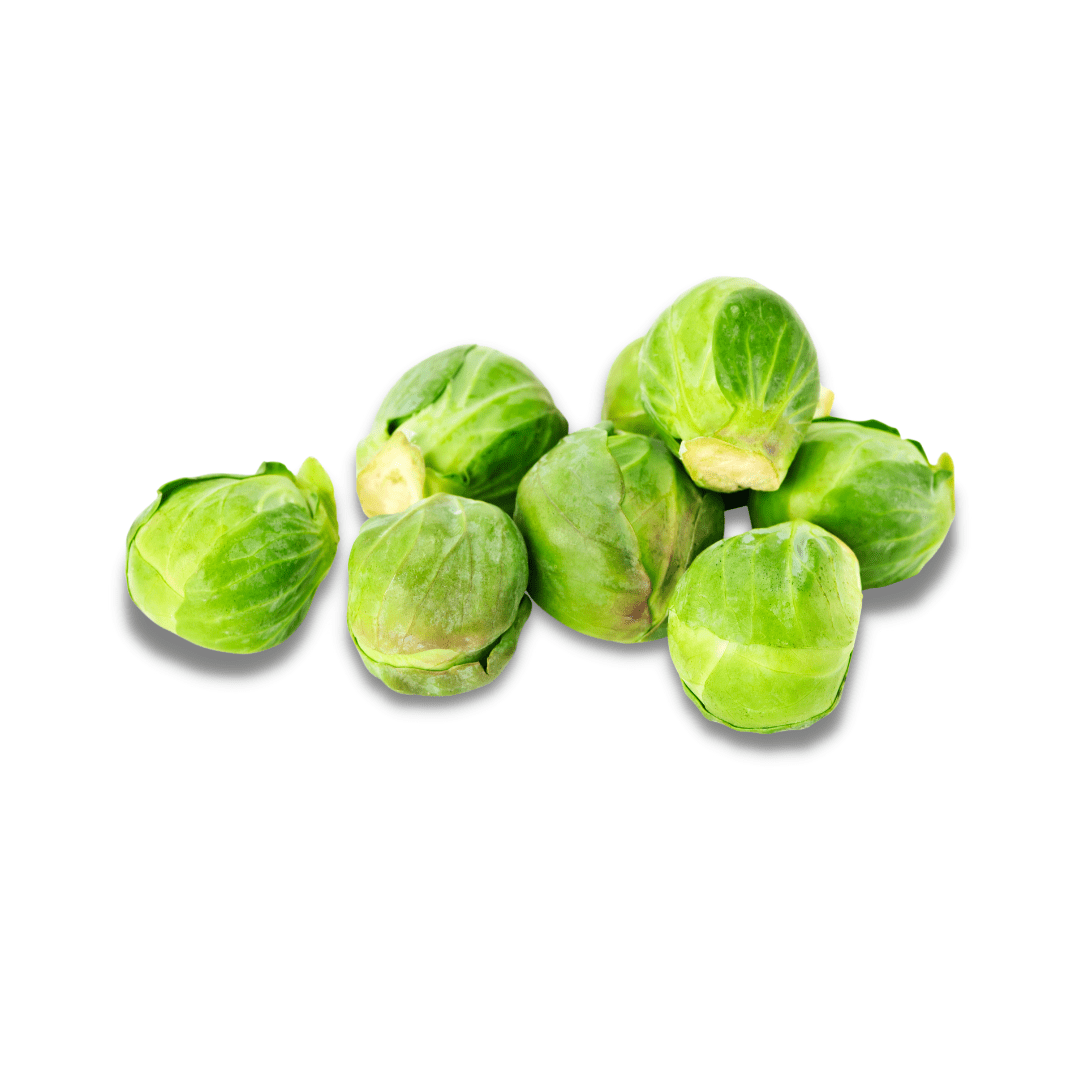About
Brussels sprouts are small, leafy vegetables that belong to the cabbage family. They are named after the city of Brussels, where they were first cultivated. Brussels sprouts have a distinctive taste and texture and are often served cooked as a side dish or used in salads.
Health benefits of Brussels sprouts:
-
Rich in vitamins and minerals: Brussels sprouts are an excellent source of vitamins C and K, and also contain significant amounts of folate, vitamin A, and potassium.
-
High in fiber: Brussels sprouts are a good source of dietary fiber, which can help promote healthy digestion and reduce the risk of digestive disorders.
-
May reduce inflammation: Brussels sprouts contain antioxidants, such as vitamin C, which may help reduce inflammation in the body.
-
May support heart health: Brussels sprouts contain compounds that may help improve cholesterol levels and reduce the risk of heart disease.
-
May support brain health: Brussels sprouts contain compounds that may help protect the brain against damage and reduce the risk of age-related cognitive decline.
List of diseases that can be cured or prevented by consuming Brussels sprouts:
-
Cancer: Brussels sprouts contain compounds that may help prevent the development of certain types of cancer, such as colon cancer.
-
Cardiovascular disease: Brussels sprouts may help reduce the risk of cardiovascular disease by improving cholesterol levels and reducing inflammation.
-
Digestive disorders: The fiber in Brussels sprouts may help promote healthy digestion and reduce the risk of digestive disorders such as constipation and irritable bowel syndrome.
Energy and Macronutrient content per 50g serving of Brussels sprouts:
| Nutrient | Amount |
|---|---|
| Energy | 16 kcal |
| Carbohydrates | 3.4 g |
| Protein | 1.2 g |
| Fat | 0.2 g |
| Fiber | 1.4 g |
| Water | 44.9 g |
Vitamin content per 50g serving of Brussels sprouts:
| Vitamin | Amount |
|---|---|
| Vitamin A | 310 IU |
| Vitamin B1 | 0.05 mg |
| Vitamin B2 | 0.07 mg |
| Vitamin B3 | 0.5 mg |
| Vitamin B6 | 0.1 mg |
| Vitamin B12 | 0.0 mcg |
| Vitamin C | 48.4 mg |
| Vitamin D | 0.0 IU |
| Vitamin E | 0.6 mg |
| Vitamin K | 109.6 mcg |
| Folate | 47.5 mcg |
| Biotin | 1.5 mcg |
Mineral content per 50g serving of Brussels sprouts:
| Mineral | Amount |
|---|---|
| Calcium | 26.5 mg |
| Iron | 0.6 mg |
| Iodine | 1.5 mcg |
| Zinc | 0.3 mg |
| Magnesium | 11.8 mg |
| Phosphorus | 23.0 mg |
| Potassium | 245.0 mg |
| Sodium | 12.5 mg |
| Chloride | 51.5 mg |
| Copper | 0.1 mg |
| Chromium | 0.0 mcg |
| Fluoride | 0.0 mcg |
| Molybdenum | 3.0 |
What are the health benefits of Brussels sprouts?
Brussels sprouts offer numerous health benefits, including being rich in vitamins, minerals, fiber, and antioxidants, which support digestion, heart health, immunity, and more.
How to cook Brussels sprouts?
Brussels sprouts can be roasted, steamed, sautéed, or even grilled to bring out their delicious flavor and unique texture.
Are Brussels sprouts good for weight loss?
Yes, Brussels sprouts are low in calories and high in fiber, making them a great addition to a weight loss diet as they help you feel fuller for longer.
What nutrients are found in Brussels sprouts?
Brussels sprouts are packed with essential nutrients like vitamin C, vitamin K, folate, potassium, and antioxidants, which contribute to their health benefits.
Can Brussels sprouts help with digestion?
Yes, the fiber content in Brussels sprouts promotes healthy digestion, aids in regular bowel movements, and supports gut health.
How do Brussels sprouts support heart health?
Brussels sprouts are rich in antioxidants and compounds that may help lower cholesterol levels, reduce inflammation, and support heart health.
Can Brussels sprouts reduce the risk of cancer?
Brussels sprouts contain compounds that have been associated with a reduced risk of certain types of cancer, including colon and lung cancer.
How to include Brussels sprouts in your diet?
Brussels sprouts can be enjoyed roasted, steamed, added to salads, stir-fries, or incorporated into various recipes as a flavorful and nutritious ingredient.
Are Brussels sprouts beneficial for skin health?
Yes, the antioxidants in Brussels sprouts can help protect the skin from damage caused by free radicals and promote a healthy complexion.
Can Brussels sprouts be enjoyed by individuals with certain allergies?
While allergies can vary, Brussels sprouts are generally well-tolerated, but individuals with known cruciferous vegetable allergies should exercise caution.
How do Brussels sprouts contribute to bone health?
Brussels sprouts are a good source of vitamin K, which plays a role in bone health and helps maintain strong and healthy bones.
Can Brussels sprouts boost the immune system?
Yes, Brussels sprouts contain vitamin C and other immune-boosting nutrients that support a healthy immune system.
Do Brussels sprouts have any impact on eye health?
Brussels sprouts contain antioxidants, including vitamin C and beta-carotene, which are beneficial for maintaining good eye health.
Can Brussels sprouts be helpful during pregnancy?
Yes, Brussels sprouts provide important nutrients like folate, which is crucial for fetal development, making them a nutritious choice during pregnancy.
How does cooking affect the nutritional value of Brussels sprouts?
Cooking methods like steaming or roasting Brussels sprouts can help retain their nutritional value, but prolonged cooking may cause nutrient loss.
Can Brussels sprouts be frozen for later use?
Yes, Brussels sprouts can be blanched and then frozen for later use, helping to preserve their freshness and flavor.
How do Brussels sprouts contribute to healthy aging?
The antioxidants and nutrients in Brussels sprouts help protect against oxidative stress, which can contribute to healthy aging.
Are Brussels sprouts recommended for athletes and active individuals?
Yes, Brussels sprouts provide a good source of energy, vitamins, and minerals that can support the nutritional needs of athletes and active individuals.









